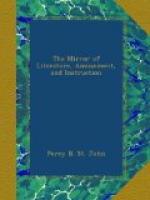The popular opinion that the Turtle Dove, of either sex, should it happen to lose its mate, remains ever after in a state of disconsolate celibacy, is, we believe, disproved by the fact, at least as respects these birds in a wild state; but we may remark, that the loss of a companion to more than one kind of domesticated bird, if it has been brought up with one, even though not in the same cage, is sometimes so severely deplored by the survivor, as to occasion its death, if the loss be not speedily supplied. The old story of Swallows passing the winter in a state of torpidity at the bottom of rivers, lakes, and ponds, has been frequently agitated, asserted to be a fact by one party, and totally disproved by the other. The reader may be amused to learn, that very recently we were assured by one, who knew it for an absolute fact, that ducks and even chickens (!!!) had been found in a certain farmer’s pond, laid up in winter quarters, which were revived by the warmth of the sun and upper air, upon being fished out of it!! “Regarding Birds’ Eggs,” says the Naturalist in his interesting Journal, “we have a very foolish superstition here (Gloucestershire:) the boys may take them unrestrained, but their mothers so dislike their being kept in the house, that they usually break them; their presence may be tolerated for a few days, but by the ensuing Sunday they are frequently destroyed, under the idea that they bring bad luck, or prevent the coming of good fortune, as if in some way offensive to the domestic deity of the hearth.”
Here, then, we pause; some abler hand may, perhaps, be tempted to take up the subject as we leave it, for there are yet gleanings, in the field, of “Superstitions and Fables connected with animals,” over which our leisure has allowed us but lightly to pass; gleanings sufficient to reward the industrious and the curious; or, it may even be, that we shall return, some day, to this topic ourselves, time and materials permitting.




